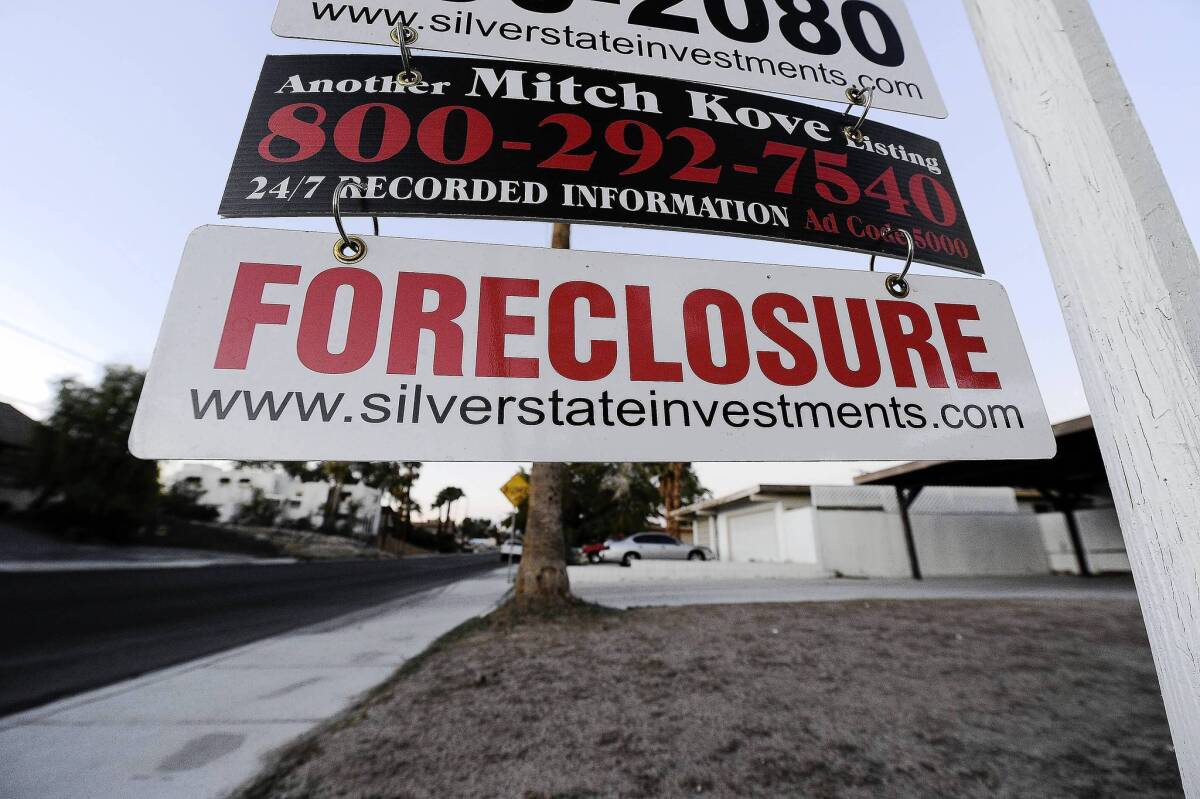FHA may need $943-million bailout

WASHINGTON — The Federal Housing Administration helped stabilize the real estate market after the subprime bubble and lay the groundwork for the recovery — and now the bill for taxpayers might be coming due.
The Obama administration’s proposed budget released Wednesday projected that the agency, which insures more than $1 trillion in mortgages, would need a $943-million bailout this year to stabilize its shaky long-term finances. It would be the first time the FHA, which is financed by the premiums it charges homeowners, has needed taxpayer funds in its 79-year history.
“If the FHA were a private financial institution, likely somebody would be fired, somebody would be fined, or the institution would find itself in receivership,” said House Financial Services Committee Chairman Jeb Hensarling (R-Texas), who has been warning that the agency was overextending itself to boost the housing market. “Instead, the FHA is merrily on its way to becoming the recipient of the next great taxpayer bailout. It’s outrageous.”
The FHA already has authority to draw the bailout money from the Treasury and does not need congressional approval. A final decision would not be made until the fiscal year ends in the fall. Obama administration officials said it was not certain the agency would need any taxpayer money because policy changes at the FHA, including higher premiums, have helped improve the outlook from just a few months ago.
PHOTOS: The costliest bank failures
The FHA reported in November that reserves to cover losses had dropped into negative territory for the year that ended Sept. 30. An independent actuarial report at the time said the FHA faced a $16.3-billion shortfall to cover projected losses in coming years — the agency had $30.3 billion in reserves to cover $46.6 billion in projected losses.
That projected shortfall is now down to $943 million, Housing and Urban Development Secretary Shaun Donovan said Wednesday.
The FHA has taken steps in recent years to boost its reserves in the wake of a surge in business. FHA Commissioner Carol Galante said Wednesday that she hoped the agency’s finances would stabilize enough through the end of this fiscal year that it would not need the bailout.
“FHA is taking every appropriate action to reduce the likelihood that such assistance is needed,” she said.
But Edward J. Pinto — a former Fannie Mae chief credit officer who has argued that lax FHA lending helped feed the foreclosure crisis in low-income neighborhoods — said the Obama budget drastically underestimated the potential for losses.
“My own estimates show the FHA is insolvent to the tune of $32 billion, based on generally accepted accounting principles,” said Pinto, a resident fellow at the American Enterprise Institute, a free-market think tank. “The billion dollars [in the proposed Obama budget] is based on government accounting principles, which as someone once said are neither accounting nor principled.”
The $1.1 trillion in FHA insurance that’s currently in force on mortgages would pose an enormous risk should the economy stop growing, Pinto said.
“If the United States has just a modest to moderate recession at any time in the next three or four years, FHA and the taxpayers will suffer catastrophic losses,” he said.
It’s no surprise that the agency needs support, said Raphael W. Bostic, a USC real estate professor. The collapse of home prices was far greater than expected when the FHA stepped in to bolster the market during the housing crisis.
“The FHA played a critical role in making sure the market didn’t completely collapse coming off of the free-fall in prices,” Bostic said.
The FHA’s finances contrast with the improving picture for Fannie Mae and Freddie Mac, the housing finance giants seized by the government in 2008 to prevent their bankruptcy.
The housing recovery helped the taxpayer-owned firms turn profits last year for the first time in six years. They have received a combined $187.5 billion in bailout money as of March 29. But as their finances have improved, they’ve been reducing the tab for taxpayers through required dividend payments.
Fannie and Freddie have paid a total of $65 billion in dividends to the Treasury. On Wednesday, Obama’s budget for the first time projected a net profit to taxpayers of $51 billion through 2023.
The FHA was created during the Great Depression to help revive the housing market during a time of crisis. It insures loans with down payments of as low as 3.5%.
As banks pulled back on lending during the recession, FHA’s role in the market expanded. Now its long-term finances are being dragged down by bad loans it backed from 2007 to 2009. One major factor in the FHA’s losses has been its reverse mortgage program, which enables older homeowners to tap the equity in their homes.
Many of those using the FHA’s reverse mortgage program took out large amounts of equity, and the FHA was on the hook for losses to the lender when the value of those homes dropped. The FHA has proposed major changes to the reverse mortgage program, Donovan said.
“If it were not for the reverse mortgage program, the FHA fund would be in significantly positive territory,” Donovan said.
More to Read
Inside the business of entertainment
The Wide Shot brings you news, analysis and insights on everything from streaming wars to production — and what it all means for the future.
You may occasionally receive promotional content from the Los Angeles Times.












